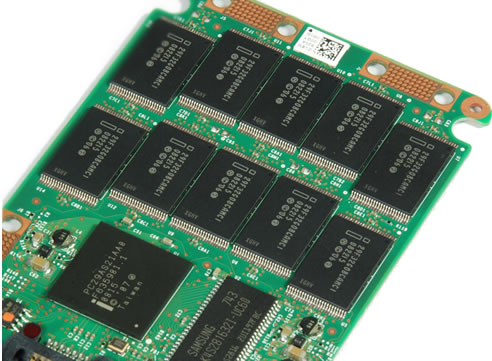As TechSpot's technical editor I get the chance to examine the industry's most impressive computer hardware on a regular basis and for that reason I have a pretty good idea of what makes for a blazing fast PC. That said, putting together a blistering fast gaming computer is not that difficult nowadays. Start with the Intel Core i7 platform, at least 6GB of high-speed DDR3 memory, a GeForce GTX 295 graphics card, and you are halfway there.
But there's still something missing in there. Something that can make the quickest computers even quicker, and that is SSD (solid state drive) technology. Since receiving a sample of the Intel X25-M drive last year, it's been my strong belief that the single most impressive upgrade to any computer is a good SSD. This shouldn't be surprising at all, as we know hard drives are the slowest components in a modern computer and not for nothing we've been spending our time and money in fast SATA drives like the 10,000 RPM Western Digital Raptor, until now.
Last year we began to see a real push for SSDs, and despite of the serious price premium involved, the technology started to prove all by itself. There should be no question that SSD technology is the way of the future, it's just a matter of when this future will become a reality for most consumers.

Solid state drives will also mark a shift in the storage industry. Today there are just a handful of traditional hard drive manufacturers, with our favorites being Samsung, Seagate, and Western Digital. However this is set to change as memory manufacturers are taking the opportunity to move into this new, exciting and hopefully lucrative market. Already we have names such as A-Data, OCZ, G.Skill, PQI, Transcend, Super Talent, Ritek, Patriot, and of course, Intel developing solid state drives.
With a vast range of MLC (multi-level cell) flash drives on offer, at least deep-pocketed early adopters can rejoice for now.
Today we will be looking at four popular mainstream SSD offerings: the G.Skill Titan 128GB, Intel X25-M 80GB, OCZ Vertex 120GB and the Super Talent UltraDrive ME 64GB. Although all these products are MLC flash-based and target the consumer enthusiast market, they do vary in price, on-board controllers, memory chips, and size caches, which should make for some very interesting results.
Let's move ahead as we discover what makes a great SSD drive and what's your best bet in today's market.